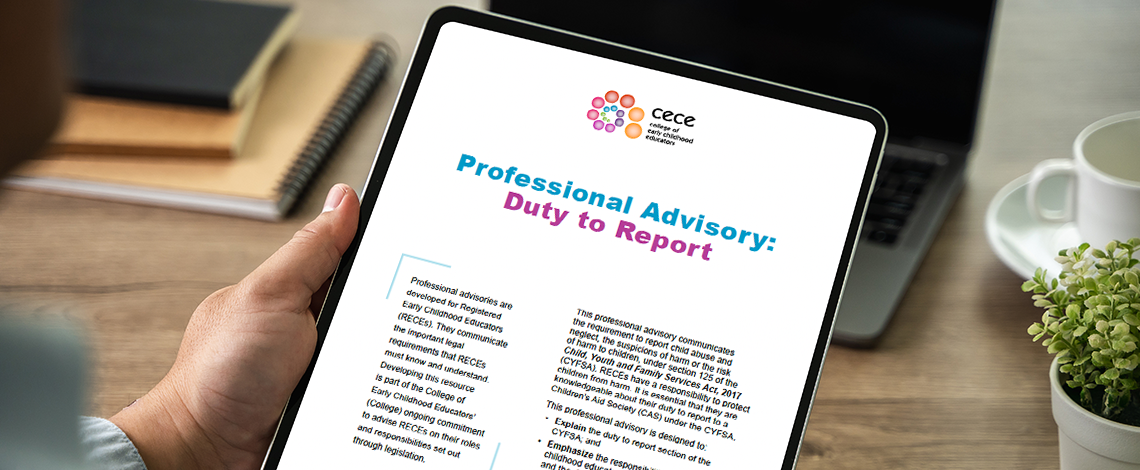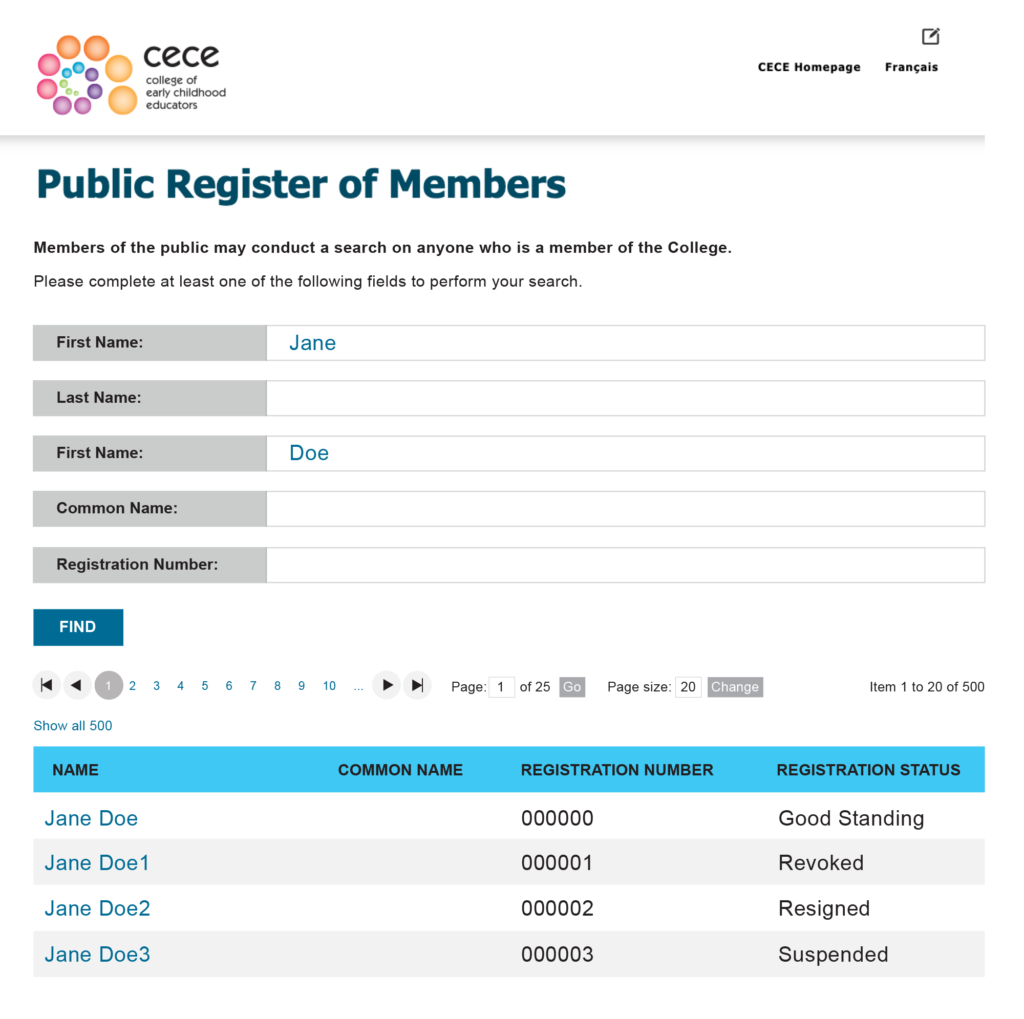Employer Newsletter – Summer 2023

The Public Register: Types of registration statuses and why they matter
Employers contribute to protecting children and families by hiring qualified staff for early childhood education and care programs and services in their organization. Therefore, it is the responsibility of an employer to ensure that the RECEs employed are eligible to practise and to know if they have any restrictions on their ability to practise.
The College maintains the Public Register , a tool available to the public that provides access to information about members and former members. This is the only way to confirm that an individual is currently a registered member of the College and is entitled to practise.
To encourage employers to make use of this resource, we developed a three-part series. In our first article, we introduced the Public Register, discussed its importance and shared what it means when someone is registered with the College. In the second article, published in the spring issue, we highlighted how to navigate the Public Register and explained Terms, Conditions and Limitations on Registration as well as Special Notices appearing on the register. In this final instalment of the series, we further explore the types of registration statuses and discuss why these matter to you as an employer.
Types of Registration Statuses
The Public Register includes information on the status of a member’s Certificate of Registration. See the image below.
When using the Public Register tool, it is important to click on the individual’s name for more details about their registration status. In addition to seeing the individual’s current registration status, you will be able to see their registration history with the College. If a member has been suspended, you will be able to see the reason for the suspension.
You will also be able to see Special Notices. A member in good standing may have Special Notices including:
-
- Professional misconduct or incapacity proceedings – a summary of previous decisions and a notation of any current proceedings, and a notation if a member resigned from the profession while facing allegations of professional misconduct.
- Criminal matters – current or previous criminal charges or conditions, along with related conditions of release and court orders, that are known to the College and relevant to the practice of the profession.
In rare cases, a member in good standing could have a Special Notice indicating that they have signed an agreement with the College not to practise.
Note: Matters currently under investigation are not included in the Public Register.
The register includes multiple members and former members who share a common name. You may need to verify your search criteria directly with the member or former member, their employer and/or the College to confirm that you have located the correct record.
The different types of registration statuses can be found here. The registration statuses are divided into two categories:
- Individuals whose registration status permits them to practise as an RECE; and
- Individuals whose registration status does not permit them to practise.
We strongly encourage you to take the time to review the statuses. For easy access, you can even print and keep them visible in your work environment.
How you can do your due diligence as an employer
You’re directly responsible for the protection, health and safety of the children in your facility. Therefore, employers that hire RECEs are expected to check the College’s Public Register. It gives you access to reliable and up-to-date information about every individual who was ever registered as an RECE in Ontario. Take advantage of this resource – it’s at your fingertips.
To return to the practice of the early childhood education profession, former members must have their Certificate of Registration re-issued to them. Learn more here.
You can also check the webpage listing of unregulated persons. The individuals listed here are not members of the College. This means that they cannot legally practise the profession of early childhood education or use the protected titles “registered early childhood educator” (RECE) or “early childhood educator” (ECE) or their French equivalents.
If you know of someone who is practising and is not a member in good standing, contact the College at discipline@college-ece.ca
___________________________
Learn more about the Public Register:

Now Available: Revised Professional Advisory: Duty to Report
All RECEs, employers and organizations in the early years and education sectors play an important role in protecting children from harm by prioritizing their safety, well-being and care through caring and responsive relationships.
Under section 125 of the Child, Youth and Family Services Act, 2017 (CYFSA), RECEs have an immediate duty to report to a Children’s Aid Society (CAS) if they have reasonable grounds to suspect that a child has been harmed or is at risk of harm or injury.
Employers also have responsibilities under the CYFSA. In addition to their own direct duty to report, they must ensure that policies outlining the duty to report are in line with CYFSA requirements and that all employees are familiar with these policies.
To support RECEs in understanding their responsibilities related to the duty to report, the College has released a newly revised Professional Advisory: Duty to Report.
Updated to reflect important member and stakeholder feedback, the revised professional advisory also encompasses important topics such as how bias, racism and stereotypes lead to overreporting; strategies for maintaining positive relationships after reporting; and responsibilities of RECEs supervising other adults in the workplace.
We highly recommend that you review the revised professional advisory to ensure you’re aware of the responsibilities and expectations of RECEs.
The revised Professional Advisory: Duty to Report:
- introduces the CYFSA and explains section 125 in the context of an RECE’s practice;
- examines reasonable grounds, professional judgment and ethical decision-making around reporting;
- describes reportable harms, risks and circumstances;
- covers consequences of not reporting;
- highlights bias, racism and stereotypes in relation to the duty to report; and
- provides guidance for RECEs related to their role and the duty to report.
Supporting RECEs when they exercise their duty to report
The revised Professional Advisory: Duty to Report states that RECEs are not required to tell a supervisor or employer that they’re making a call to a CAS, as it is not required under the CYFSA. If an RECE chooses to go to a supervisor/employer with concerns of suspected child abuse or neglect, the supervisor/employer has an obligation to provide them with the necessary allowances, support and encouragement to be able to make the report.
For more information, review pg. 18 “Expectations of RECEs responsible for Supervisees” in the Professional Advisory: Duty to Report.

Welcoming new RECEs into the profession
The transition from student to RECE is an exciting step! Recent graduates are entering the profession with new knowledge and skills and are excited to contribute to the early years sector. As leaders and employers of RECEs, you play an important role in supporting, guiding and encouraging these new members of the profession as they transition into practice.
How can you help?
You can start by making new RECEs feel welcome in the profession and their new practice setting. This will cultivate a culture of mutual support and collaboration among all staff.
- Identify their strengths and build on them: Through your communication with new RECEs, find out about their unique strengths as well as areas of practice they’d like to develop further and provide them with opportunities to do so. Invite them to ask questions and engage in reflective practice, encouraging a culture of co-learning.
- Support new RECEs through mentorship or coaching: Facilitate and encourage the development of mentoring or coaching relationships between new RECEs and more experienced RECEs within the practice setting or with others in the learning community. Or, consider this an opportunity to learn more about mentoring or coaching yourself. Here’s a resource to learn more about mentoring in the early childhood education profession.
- Establish a collaborative learning environment: Consider developing a community of practice where all staff can share unique knowledge and experiences with each other. This is also a great way to build a welcoming and inclusive learning environment where new and experienced RECEs can learn with and from each other and feel supported through challenging practice situations.
- Create an inclusive environment where new RECEs feel valued and respected: As employers, you contribute to making staff feel like valued members of the team. Foster an environment where new RECEs are encouraged to share their insights, ideas and learnings. Involve new RECEs in ethical decision-making processes, be open to their new knowledge and skills and celebrate their accomplishments.
Provide guidance and direction to new RECEs that is respectful and fair. As leaders, ensure a level of supervision that is appropriate in light of the RECE’s education, training, experience and the activities being performed. Supervisors who are RECEs may benefit from this helpful Practice Note on Professional Supervision of Supervisees.
College resources to share with new RECEs
The College has a breadth of resources on various practice topics that we’ve developed to support RECEs in their practice. We encourage employers and supervisors to share these resources with new RECEs, particularly on topics that are key for new RECEs transitioning into practice.
- Practice Guideline on Communication and Collaboration
- Practice Guideline on Diversity and Culture
- Practice Guideline on Pedagogical Practice
- Practice Guideline on Supporting Positive Interactions with Children
- Professional Advisory on Duty to Report
- Practice Note on Professional Supervision of Children
